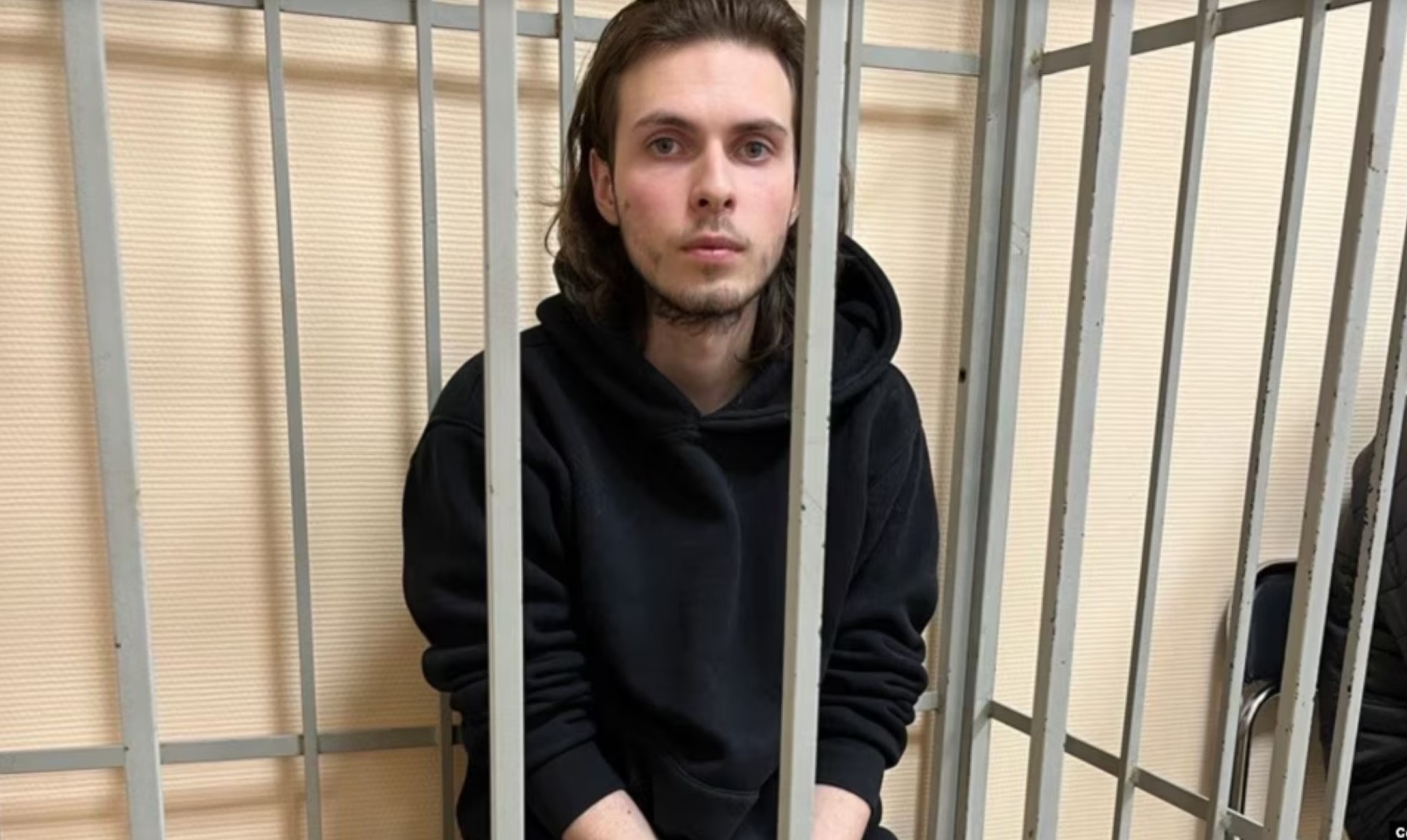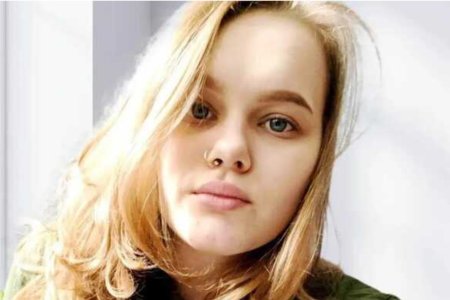
20-year-old Ilya Hibeskul is imprisoned in Russia and facing a long sentence on ‘justification of terrorism, or‘calls to terrorism’ charges over social media reposts which the young student could not have posted as he was handcuffed and held in a Russian FSB car. The Kaliningrad FSB were clearly looking to improve their statistics on ‘fighting terrorism’, and what better target than a Ukrainian who had refused Russian citizenship and tried to leave for Poland? The authoritative Memorial Support for Political Prisoners Project have scrutinized and condemned the charges and ‘evidence’ against the Ukrainian and have recognized him as a political prisoner.
Ilya Hibeskul turned 20 on 2 August 2023, making him Russia’s youngest known Ukrainian political prisoner. He was studying in the philosophy faculty of the Karazin Kharkiv National University in February 2022, but is from Volnovakha in Donetsk oblast and had returned home to renew his passport when Russia began its full-scale invasion of Ukraine. Volnovakha came under fire by the second day of the full-scale invasion and fell under Russian occupation on 11 March 2022.
RFE/RL’s Northern Realities has spoken with Ilya’s lawyer, Mikhail Uvarov, who has learned from the young man how he and his parents came to be in Russia. It seems that they remained in Volnovakha until the end of March 2022, when the family were sent to occupied Donetsk for Russia’s so-called ‘filtration’ (where Ukrainians were interrogated about their views, and in many cases, even checked for tattoos.
From there the only way out was to Russia and the family ended up in Voronezh. Ilya organized temporary refuge and found work in a shop but did not apply for Russian citizenship and had no plans to stay in Russia. He explains that he wanted to get to Kraków in Poland where a friend of his was already living
He decided to try to reach Poland by coach from Kaliningrad and arrived at the latter on 14 April. Unfortunately, the young man had only his Ukrainian ID card, not a Ukrainian passport, and first the coach driver, and then, on a second attempt, Polish border guards refused to allow him into Poland.
Worth noting that the Russian FSB (which the border guard service is part of) grilled Hibeskul before each of these attempts to cross into Poland. Before the second, in particular, he was held at the Russian border crossing for seven hours and interrogated, with the FSB asking his opinion of Russian president Vladimir Putin, how he viewed the war, Ukraine, etc, with all of this videoed. Ilya says that he answered using general phrases, “neutrally”. As well as taking his fingerprints, the FSB also searched his personal things and looked at his telephone and laptop. Yet twice they allowed him to leave Russia, and it was only because of Poland’s refusal to allow him in without a passport that he ended up back at the border crossing for the third time.
Initially the border guards simply removed the record of his crossing the border on his migration card, and then took him to a room where two men looked at his documents for a while and suggested that he return to Voronezh. It is unclear whether this was cruel mockery, or whether it was after this that the FSB decided to detain the young Ukrainian.
He has recounted how, with his arms in handcuffs behind his back, he was forced into a car and driven away without knowing where. There were three FSB officers in the car, and one of them took his phone, thrust it close to his face in order to unblock it and then spent the entire journey doing something with the phone. Ilya asked what he was doing but was ignored.
In Kaliningrad he was taken to a police station where administrative charges were laid over supposed ‘petty hooliganism’. It was claimed that, at a time when he was being taken by his captors to Kaliningrad, he had instead used foul language and caused a public disturbance on a particular street in Kaliningrad. He was jailed for 14 days and placed in a temporary holding facility.
It was only after this that the new criminal charges were laid, under Article 205.2 § 2 ‘Justification of terrorism’. The charges are over nine reposts on a VKontakte page that Ilya had created in late 2019, and then never used. All of them appeared, at intervals of around 15 minutes in the early hours of 15 April, while Ilya was being taken, in handcuffs, to Kaliningrad. The young Ukrainian was clearly not in a possession to have reposted anything, since he had no access to his phone and no means for getting on to the Internet, even should he have felt the desire to suddenly make multiple reposts from a social media page he had not used for four years. The cynicism around this flagrant fabrication of ‘evidence’ is shocking, with the FSB so certain of their impunity that they did not even try to make all the posts follow on from each other. Two pertain to Ukraine’s Azov Regiment, which Russia has demonized for years, and in 2022 declared ‘terrorist’, with one calling on people to donate to it. Others, however, include a repost from a ‘Russian nationalist’ page and an interview with Dzhokhar Dudayev, the leader of the Chechen independence movement. In short, anything to prop up charges under Article 205.2.
Hibeskul was placed in a SIZO [remand prison] where he has been held ever since. On 23 May 2023, he was placed on Rosfinmonitoring’s notorious ‘list of terrorists and extremists’.
Mikhail Avarov assumes that the FSB needed ‘good statistics’ regarding prosecutions on terrorism charges. With respect to why his client was targeted, he notes that “he hadn’t sworn allegiance to the Russian Federation, had not taken Russian citizenship and had decided to leave for Poland. Of course, if he had beat his breast and said “I love Russia”, this wouldn’t have happened.”
It is excellent that the young man has a good lawyer, however this is, as Memorial has noted, a politically motivated prosecution with courts in Russia virtually always handing down the sentences demanded of them.



